Treat, prevent, and improve any skin issue; it is important to evaluate and understand what are the causes and conditions behind.
Someone experiencing acne-prone skin should make the right choices to see real improvements because applying the wrong products can make it worse.
Acne is an inflammatory skin condition that affects oil glands and hair follicles. It is a skin disorder that anyone can get most commonly between ages 11 to 30, and it can cause many types of pimples such as whiteheads, blackheads & cysts.
To learn more about Skin Care, we suggest you WithinTheTrend.
Contents
What causes acne?
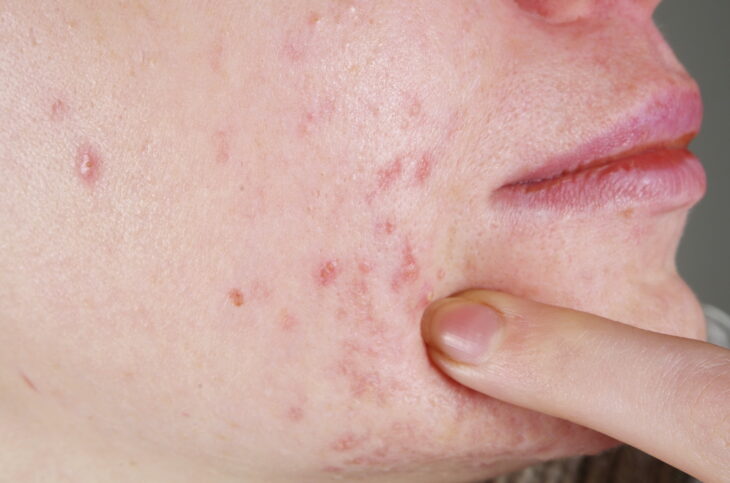
Source: evanaturals
- Presence of bacteria on the skin
The name of the bacteria that live in the skin and can cause pimples is called propionibacterium acnes.
- Excessive sebum/oil production
If skin cells, hair, and sebum in your skin clump together, a plug is created, and this can be infected by bacteria causing pimples.
- Clogged hair follicles
Skin glands produce sebum, which carries dead skin cells to the surface of the skin through a follicle creating hair. A pimple appears when these follicles get blocked, and sebum starts to build under the skin. This cause could be hereditary.
- Excess activity of a type of hormone (androgens)
Rising androgen levels cause the oil glands under the skin to grow, producing excessive sebum, which can cause bacteria to grow.
Types of acne
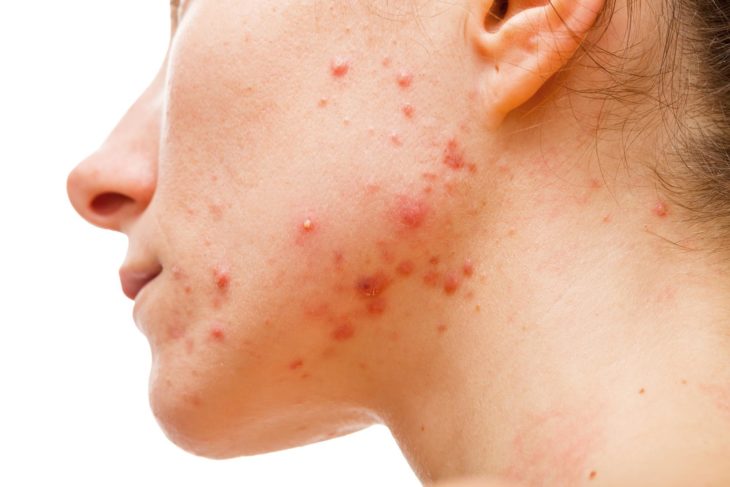
Source: Guidelines
- Noninflammatory
Light to moderate type of acne, it is easy to treat. Mostly blackheads (open plugged pores) and whiteheads (closed plugged pores)
- Inflammatory
They tend to be more visible, either a papule, which can be presented as small red bumps or pustule, which is a pimple with pus.
The more severe type of acne is nodules. These are larger and painful lumps beneath the skin or cysts, which tend to be bigger, more painful, and filled with pus.
Other important factors that trigger acne
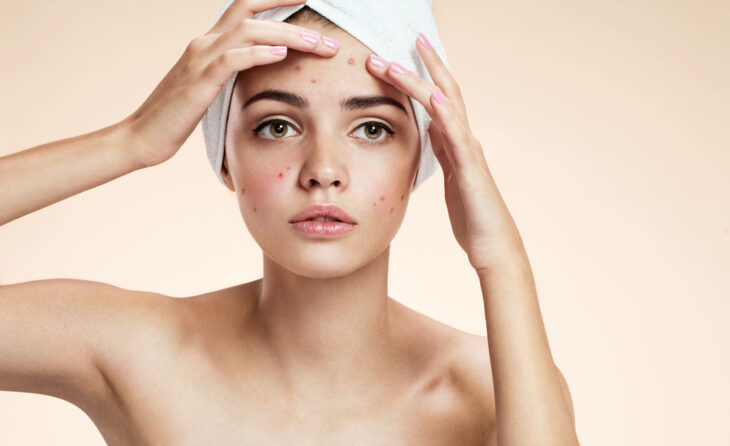
Source: medium
- Picking on pimples / Friction on the skin
Popping pimples will not only spread bacteria into other pores but also can leave scars that will be harder to remove. Putting pressure or friction using a cellphone, backpack, helmets can also worsen acne-prone skin.
- Wrong use of skincare, makeup, and even hair products
Many people think that putting a bunch of acne products at once on your skin will help you heal, but it shocks your skin more than anything, plus it’s a lot of harsh chemicals. Acne can also be caused by using comedogenic and oil-based, usually coming from makeup and hair products.
- Stress
Anxiety and stress are triggers to worsen acne.
- Diet
Processed food, dairy products such as skim milk and refined carbs. Chocolate is one of the things that can be causing or worsening acne.
- Medicines
Most containing corticosteroids, testosterone or lithium
- Hormonal changes
Low amounts of androgens in the blood of women can worsen acne. Hormonal changes during pregnancy and/or oral contraceptives can affect the production of sebum.
Periods before and after menstruation is another reason why women could be getting pimples.
- Humidity and Pollution
Overexposure to sun, weather, and contamination are also important causes to consider.
- Genetics
If both parents had acne, you’re likely to develop it, too.
How to treat acne
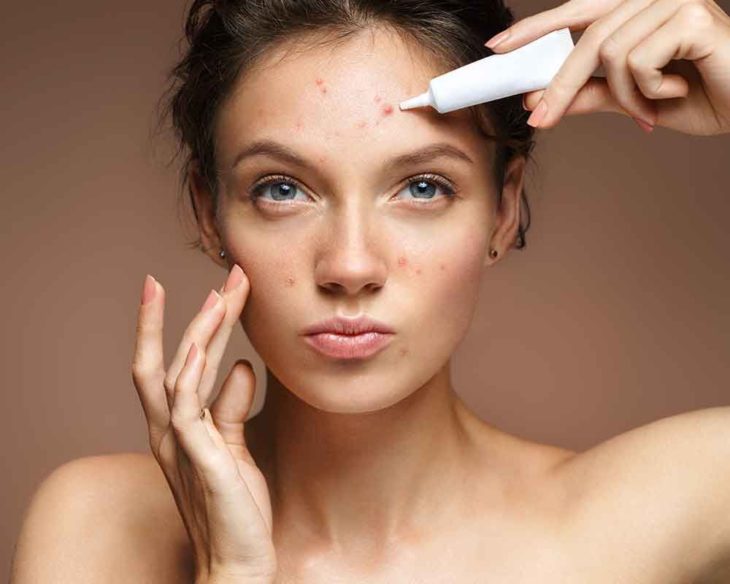
Source: Amino Acids Review
Treatments depend on the type of acne you have. You must be patient and dont expect to see changes right away. Most of the time, improving acne-prone skin takes time. You could start seeing improvement right away, but also it could take months depending on your skin.
Having the opinion of a professional is something that will always help. Keep in mind that the earlier you start taking care of your skin, the better to see good improvement.
Mild acne can be treated following a good skin care regimen using the right products and being consistent. Some over the counter, topical products to look for if you have mild acne:
- Salicylic Acid
- Retinoids
- Benzoyl Peroxide
- Clindamycin
- Antibacterial soap
There are a few types of medications that a doctor could prescribe for severe acne such as:
- Anti-inflammatory medications
- Vitamin A Derivate
- Antibiotics
- Topical Antiseptic
If you are over 25 years old, you are using prescription creams and antibiotics, but they don’t seem to be enough. You might then consider doing some medical procedures which are provided at your doctor’s office. These procedures include:
- Light therapy
- Chemical peels
- Corticosteroid injections
- 4 Home remedies to treat acne
Using home remedies is one of the things you could try to improve acne. Remember, if you have a severe acne problem, you must talk to your doctor before you try anything at home.
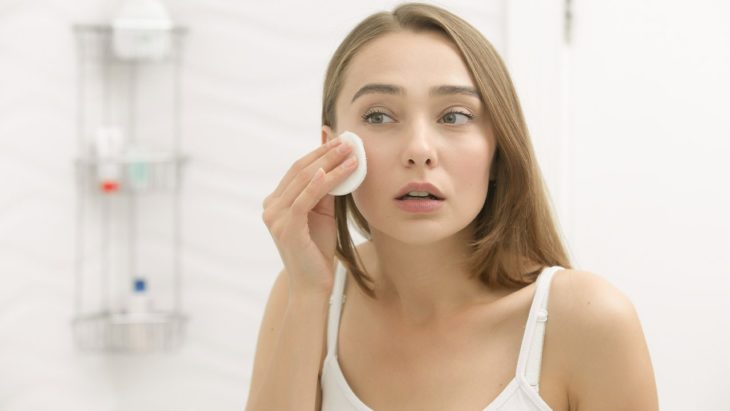
Source: lorealparisusa
Apple Cider Vinegar
Apple cider vinegar is known to fight bacteria, improve skin texture, and lower inflammation.
Tip: After cleansing your skin, use a cotton pad, and gently apply a mix of apple cider vinegar with water. Let it sit for 10-20 seconds and rinse with lukewarm water.
Tea Tree Oil
This essential oil is well known for its ability to fight bacteria and reduce inflammation.
Tip: Apply it as a spot treatment at night after cleansing your skin, on specific spots. Wait a few minutes and apply moisturizer.
Aloe Vera
The gel inside this plant is known to treat burns and reduce inflammation. It also contains salicylic acid and sulfur, which are great ingredients to treat acne.
Tip: Apply the gel directly to clean skin day and night.
Antioxidants
Green, turmeric, echinacea, rosemary teas are a great option to improve skin texture, detoxify, and reduce the production of sebum. They have great benefits for your body and skin.
Tip: Boil one or two of these teas together and make your toner. Wait until the boiled water cools down. Put the water into a clean spray bottle and spritz as many times as you want. You can also use a cotton pad and gently tap it into your skin after cleansing—no need to rinse.
10 tips to improve acne-prone skin
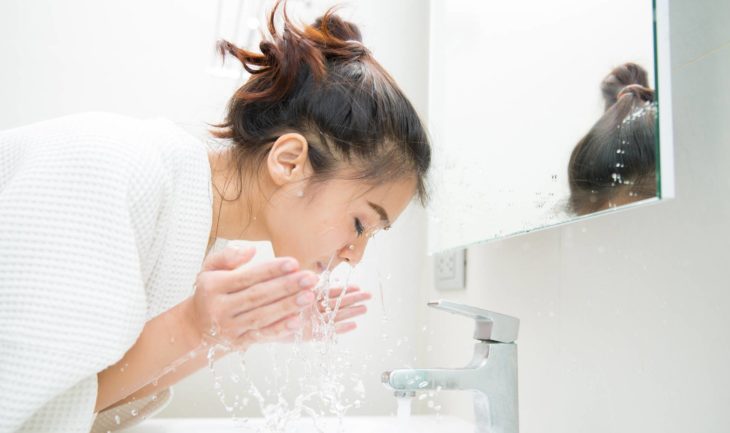
Source: skincare
- Definitely, drink lots of water.
- If you like to exfoliate your skin, remember to use a gentle product 1 or 2 times a week to remove the dead skin and debris. Note: If your skin is sensitive, it is better not to exfoliate.
- Wash your face right after workouts or sports activities.
- ‘Less is more’ when it comes to using products.
- Try to heal your acne internally with a diet for better results. This means cutting out SUGAR, GLUTEN, AND DAIRY.
- Be aware of supplements. It is commonly known that some of the ingredients in them can cause breakups.
- Be careful when using oils. Many oils are comedogenic and will cause acne by clogging your pores and causing breakups.
- Stop picking your pimples.
- Make sure you clean and disinfect anything that is in contact with your skin, makeup brushes, sponges, bedding sheets. Keep your hair clean as it can collect sebum.
- Look for non-comedogenic and oil-free products. Avoid greasy sunscreens.
- Anxiety can cause acne too, try to keep an eye on your stress levels. Practice meditation, yoga, doing exercise, get your hours of sleep and take breaks during work hours to breath.
